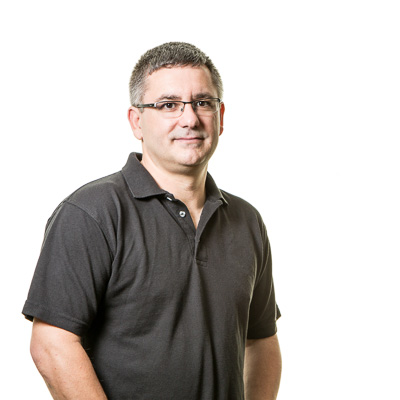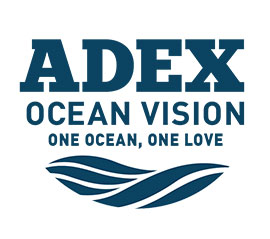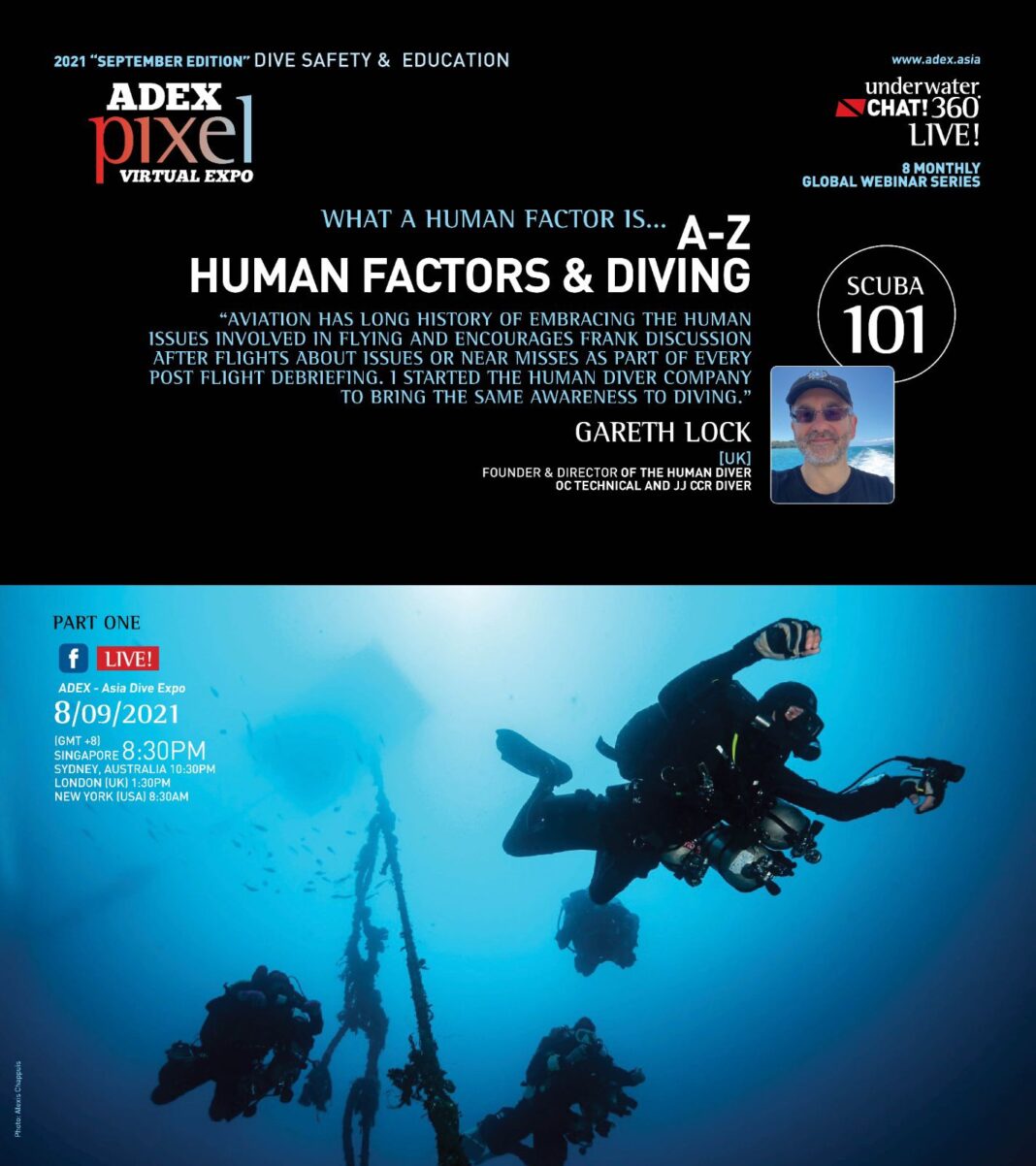Gareth Lock has pioneered the human factor in diving, leading to a decrease in accidents in diving. Read more here!
Gareth is part of our upcoming #ADEXPixelExpo – 8 Monthly Global Webinar Series. This September, we focus on Dive Safety and Education. Read on to find out more!
Biography of Gareth Lock

Gareth Lock is a retired RAF senior office Navigator of 25 years, dive educator, and the Director of The Human Diver — a company that specialises in teaching the diving community about human factors.
His diving record to date includes over 800 dives around the globe with OC and CCR up to depths of over 70m. While Gareth dives mainly in cold waters around the UK, he has also been to Norway, the US, Canada, Mexico, and Bonaire. Underwater wreck photography is his main passion.
How he started
While on vacation in 2000, Gareth first got certified as a diver. Fast forward after five years of not diving, Gareth got hooked on diving again after visiting Cape Town and San Diego on a work trip in 2005.
Simultaneously, while he was studying for his MSc in Aerospace Systems, he realised that the training in his human factors module was of substandard quality and consistency. Accidents and near-misses caused by diving are typically a result of human error, not diving equipment or skills.
With his considerable experience as a Squadron Leader in the RAF, he recognised that complacency, breakdowns in communication, poor decision-making, a lack of situational awareness, or ineffective teamwork and/or leadership was a key cause of diving accidents.
The most effective teams never lose sight of each other’s interactions and performance.
Thus, he decided more could be done to improve his own skills. Seeing the consistency of quality from GUE diver-trainer programs, he decided to start training through GUE.
Gareth Lock has spent the last 8 years focusing on the role of human factors and non-technical in diving successes and failures. He developed his initial knowledge during 25 years in the Royal Air Force as a flight instructor and systems engineer. Gareth focused his Ph.D. research in 2010 on human factors in diving incidents, aiming to provide a taxonomy by which incidents and accidents could be classified to facilitate the sharing of data.
With this combination of knowledge, theory, and his technical diving training (GUE Tech 2, JJ-CCR Mod 1), he has successfully created a series of training programs designed to improve driving safety and diver performance under The Human Diver.
The Human Factor
Despite being the root causes of most diving accidents, human factors were rarely touched on and holistic training towards these little factors did not exist.
You can’t deny that diving is a risky activity, whether you’ve done it before or not. Getting into an underwater environment requires us to use specialist equipment, as being underwater impairs our ability to breathe naturally and limits some of our senses. We are also exposed to some potentially dangerous conditions – temperature, currents and air pressure for starters. Not to mention, we will encounter sea creatures that generally may not welcome us into their realm. Those dynamics can be made far worse by humans.
View this post on Instagram
That is why since 2016, when the first pilot class of The Human Factor was launched, Gareth has dedicated himself to diving, diver training, and the training of high-performance teams after his 25-year career in the Royal Air Force.
He has successfully delivered a series of human factors programs both online and in-person to improve diver and team performance and safety. Gareth has trained over 300 divers in face-to-face classes with students from multiple agencies and high-performance certification levels from HQ and ITT-level staff to CCR technical divers.
Across the globe, he has taught across the globe from Seattle throughout the US, in Europe, the Middle East, and Australia, and New Zealand. Using aviation, oil, and gas, and healthcare core skills and knowledge to improve diving safety, these programs address situational awareness, decision making, teamwork, communications, and Just Culture. In April 2018, Gareth won the 2018 TekDiveUSA award for Innovation.
He has published numerous papers and articles focusing on human factors, non-technical skills and a Just Culture in diving. A year later, he published his first book titled ‘Under Pressure: Diving Deeper with Human Factors,’ whose focus is on combining case studies, theory, and practical exercises to improve diving safety.
View this post on Instagram
Currently he is working on a number of research projects as well as a documentary focused on human factors, human errors and a Just Culture in diving, where individuals are accountable for their wilful misconduct or gross negligence, and create a more environment for real learning.
Gareth lives with his family in Malmesbury, Wiltshire, and travels the world sharing his knowledge of how human behaviour can affect diving, facilitating ‘counter-errorism in diving’. Through his company, The Human Diver, Gareth trains high-performance teams and speaks at conferences focused on diving, extreme sports, and supporting teams in high-risk sectors.
Hear more about Gareth Lock
How do human factors influence an inherently risky activity like scuba diving? Hear more from Gareth Lock:
- Day/Date: 8 September 2021, Wed
- Time: 8:30 PM (Singapore) | 10:30 PM (Sydney, Australia) | 1:30 PM (London, UK) | 8:30 AM (New York, USA)
- Where: ADEX Official FB Page | APE Homepage
–
#APE 8TH MONTHLY VIRTUAL EVENT 2021 SCHEDULE – SEPTEMBER SERIES
Organised by the digital platform for ADEX Asia Dive Expo, ADEX Pixel Expo, #APE 8th Monthly Virtual Event 2021 celebrates the diversity of the ocean and its diving landscape, with a series of events happening on the 8th of each month, with an aim to bring trending dialogue and deep-rooted tales on the pulse of scuba diving, with inspirational guests and insightful stories!
This September Edition focuses on Dive Safety and Education. Click here to find out more about upcoming events and schedule!


